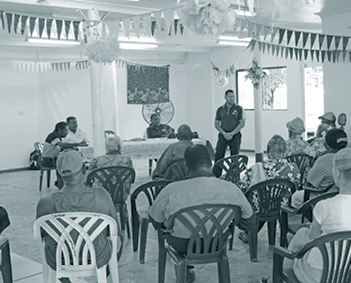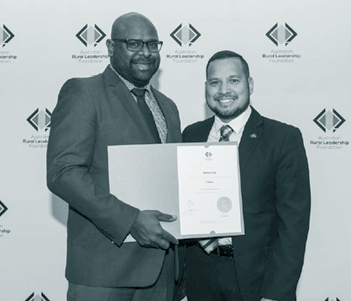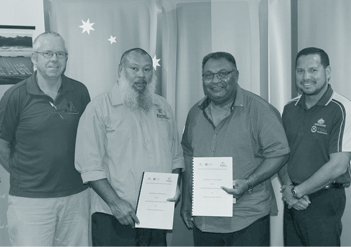Delivering Outcomes
The TSRA has continued to deliver programmes and implement policies and projects to achieve the targeted outcomes identified in the Torres Strait Development Plan 2014-2018.
Community Engagement
As part of the TSRA’s commitment to engage with our communities, the TSRA Chairperson and I completed visits to six communities as part of our engagement programme. These engagement visits will continue in 2018-2019, with the aim of visiting all communities in the region. Community engagement visits by TSRA programme areas at the operational level have been ongoing and will continue in the coming financial year as well. These visits are conducted by TSRA project staff to work with their clients and review the status of TSRA projects and initiatives.
Leadership Development
The TSRA is proud to continue its partnership with the Australian Rural Leadership Foundation, delivering a suite of leadership programmes tailored for youth, women and emerging leaders in our region.
I was honoured to join the TSRA-sponsored graduate, Mr Andrew Lui, and 30 other successful participants of the flagship Australian Rural Leadership Program Course 23, for the gala event held at the National Museum of Australia in October 2017 to celebrate the 25th anniversary of the Australian Rural Leadership Foundation. Andrew is the TSRA’s eighth candidate who has successfully completed the programme. I look forward to seeing leaders like Andrew return to our community to influence and drive positive change in the region.
Simplifying and Streamlining Grant Funding Administration
In the reporting period, the TSRA successfully completed the rollout of the Smarty Grants system. Further refinements were tested and successfully implemented to improve the experience for funding applicants, including the option for submitting online applications. Community user feedback has been positive, on the seamless ease of use and the reduction in the time and complexity involved in applying for funding.
I look forward to seeing leaders like Andrew return to our community to influence and drive positive change in the region.
Left to right: Mr Andrew Lui, Australian Rural Leadership Program Course 23 graduate, and Mr Wayne See Kee, TSRA CEO, at the graduation ceremony in October 2017
The TSRA has a strong commitment to the Australian Government’s initiative to reduce red tape and, along with the implementation of the Smarty Grants system, the TSRA also undertook to streamline our standard grant agreements with assistance from the Grants Policy Team in the Department of Finance and the Australian Government Solicitor. This resulted in grant agreement paperwork being reduced in the majority of projects by over 80 per cent. The feedback from grant recipients in the community was again positive, with the streamlined agreements rolled out in June 2018 for projects commencing on 1 July 2018.
Integrated Service Delivery
During 2017-2018, work continued on reviewing and negotiating an updated ISD governance framework with our counterparts at the Commonwealth, state and local government levels. This culminated in the formation of the Torres Strait Regional Coordination Group in April 2018, bringing together elected representatives and senior staff from the TSRA and local government bodies in the region. Through the Torres Strait Regional Coordination Group, the TSRA Board and administration remain committed to working in partnership with all government and non-government stakeholders to address the key challenges of economic development, renewable energy, waste management, housing, climate change and coastal erosion.
Through the Torres Strait Regional Coordination Group, the TSRA Board and administration remain committed to working in partnership with all government and non-government stakeholders to address the key challenges of economic development, renewable energy, waste management, housing, climate change and coastal erosion.
Economic Development
Following the successful launch of the first phase of the Regional Economic Investment Strategy (REIS) in 2016-2017, targeting the fisheries industry, the second phase of the REIS, aimed at the arts and creative industries, was launched in July 2017.
The Arts and Creative Industries Business Growth Package is designed to support Torres Strait businesses that rely on ‘creativity’ as their primary source of value. The package targets new and existing businesses seeking to build on traditional arts and culture as well as those looking to develop other businesses, across six creative industries segments: music, visual and performing arts; film, television and radio; architecture and design; advertising and marketing; software and digital content; and writing and publishing. More information on the REIS can found in Section 2 of this report.
Workplace Health and Safety
In the reporting period the TSRA continued to maintain and meet its obligations under the Work Health and Safety Act 2011 (Cth). The TSRA has in place an active Workplace Health and Safety Committee with representation from all of the TSRA’s designated work groups. In 2017-2018, there was only one notification made to Comcare under the Act. More details on work health and safety can be found in Section 4 of this report.
Left to right: Mr Stephen Wilton, Northern Peninsula Area Regional Council (NPARC) CEO, Mr Edward Newman, NPARC Mayor, Mr Napau Pedro Stephen AM, TSRA Chairperson, and Mr Wayne See Kee, TSRA CEO, at the signing of the MOU between the TSRA and the NPARC
Local Government Memorandum of Understanding
During the reporting period, the TSRA formally executed a memorandum of understanding (MOU) with the NPARC. The MOU strengthens the collaboration between the TSRA and the NPARC and formalises the ongoing working relationships until 2020. It also commits the two organisations to formally identify and coordinate joint strategic objectives, particularly to improve community health and wellbeing, plan future regional services and infrastructure development, and pursue opportunities for sustainable economic development.
Our Workforce
At a Glance
The TSRA workforce has increased from 159 to 162 since the previous reporting period. Of those staff, 122 are Torres Strait Islander and Aboriginal people. The TSRA has one of the highest percentages of Indigenous employment (just over 75 per cent) of any government entity. This is an achievement we are proud of. The TSRA also maintains a good gender balance, with 82 males and 80 females in its workforce.
Opportunities
The TSRA continues to provide internal opportunities for the training and development of Torres Strait Islander and Aboriginal staff to increase their capacity and skills so they can apply for higher level positions not only in the TSRA but across the Australian Public Service. The TSRA also provides external opportunities and support for local community members through our leadership capacity building initiatives and the Assistance with Tertiary Education Scheme, which targets university students from the region. More information on these initiatives can be found in Section 2 of this report.
The TSRA provides external opportunities and support for local community members through our leadership capacity building initiatives and the Assistance with Tertiary Education Scheme, which targets university students from the region.
Outlook
Financial
The TSRA has secured a budget appropriation that will enable it to maintain the existing programmes and service levels in the region in the coming financial year. The TSRA has also secured external non-appropriation funding for specific initiatives, such as further purchases of licences held by the Transferrable Vessel Holder sector of the tropical rock lobster fishery. Details on TSRA financial performance over the reporting period are contained in Section 5 of this report.
Torres Strait Development Plan
The TSRA Board is working closely with the administration to finalise the new Torres Strait Development Plan for 2019-2022 in the 2018-2019 financial year. The new Development Plan will replace the existing Torres Strait Development Plan 2014-2018 when it expires in 2018. A series of workshops were held in the reporting period to develop the Board’s priorities and programme mandates for inclusion in the new Development Plan.
Acknowledgement
I am proud of the achievements and progress we have made throughout 2017-2018. My appointment as Chief Executive Officer comes to an end at the end of this reporting period, after which I will be moving to another role in the Australian Government. I have been privileged to lead the TSRA administration as Chief Executive Officer since 2004-2005.
I would particularly like to thank the Chairperson, Mr Napau Pedro Stephen AM, Board members and administration staff for their ongoing valuable contribution and commitment to the TSRA, and acknowledge the great work that they perform every day. They are making a real difference to the communities in the Torres Strait and Northern Peninsula Area.
It has been a true honour for me to serve the TSRA and our communities in this very important role – I cannot express how proud I am and always will be of the agency.
I wish the incoming Chief Executive Officer every success in working with the Board and administration to continue to build on our achievements in the coming year.
I also acknowledge the Elders, Traditional Owners, Native Title Prescribed Bodies Corporate, local government councillors and communities of the region for the support and hospitality extended to the TSRA when we visit your communities.
Wayne See Kee
Chief Executive Officer





